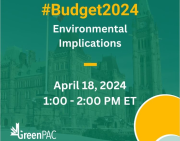Kendall Anderson's Research & Analysis
Equitable Transition
February 24, 2025
Event
Minding the Gap: Barriers and Key Themes in Equality and Inclusion
Dialogue 2 in the Women in Energy Transformation series
Equitable Transition
February 24, 2025
Event
Profiling Women Leaders of the Energy Transformation
Dialogue 1 in the Women in Energy Transformation series
Equitable Transition
February 24, 2025
Event
Solutions, Career Pathways, and Intergenerational Networking
Dialogue 3 in the Women in Energy Transformation series

Equitable Transition
May 22, 2024
Article
What are “green” jobs and how can postsecondary institutions prepare students for them?
Reflections from the Colleges and Institutes Canada 2024 Connection Conference

